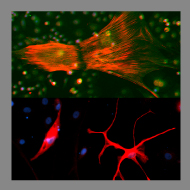
Discovery could help develop a cure for heart disease in humans and cats
Scientists have identified, for the first time, the conditions required to generate stem cells from domestic cats - a finding that could have significant benefits for feline and human health.
Researchers made the breakthrough during a study into feline hypertrophic cardiomyopathy (HCM), a common and severe heart condition that affects around 15 per cent of the UK’s feline population.
Dr Luke Dutton from the Royal Veterinary College (RVC) identified the conditions required to create induced pluripotent stem cells (iPSCs). These are laboratory-grown stem cells that can make any type of cell or tissue in the body.
Although creating iPSCs has been done before in wild cats, this is the first time it has been achieved in domestic cats.
Dr Dutton explains: “Not only is this study the first reported generation of iPSCs from domestic cats, but these cells can now be used in a novel disease model.
“This will allow us to study the disease processes present in these cats in ways that have not been possible with the ultimate goal of identifying new therapeutic agents that may slow or even stop the disease process. We would then hope to translate these agents into the feline clinic.”
HCM is caused by a genetic mutation which affects the cells of the heart muscle. There are currently no proven treatments to stop or reverse the condition, leading to a poor prognosis for affected cats.
A major issue of studying heart disease at a cellular level is that heart muscles do not survive in a laboratory environment. When studying human heart cells, scientists have overcome this by turning ordinary skin cells into pluripotent stem cells, termed iPSCs. It is then possible to generate heart muscles to study from these iPSCs.
Researchers say the discovery paves the way for further research into how to turn feline iPSCs into heart cells and then, once successful, testing drug therapies that could improve outcomes for cats with HCM.
With around 1 in 500 people in the UK suffering from HCM, scientists also believe the translational benefits of this project are potentially highly significant. If the therapies that researchers test on feline heart cells turn out to be effective, it could set the stage for testing these treatments on humans.
The study was carried out under the supervision of Professor David Connolly, Dr Jayesh Dudhia and Dr Debbie Guest, as part of Dr Dutton’s PhD at the RVC in collaboration with Animal Health Trust (AHT).
Dr Debbie Guest, head of stem cell research at the AHT, said: “This is the first report on the successful generation of domestic cat iPSCs. These cells not only bring hope to cats suffering from HCM but allow us to develop new tools to study conditions affecting other tissue types in the future.”
Image (C) RVC.



 The Animal and Plant Health Agency (APHA) has updated its online reporting service for dead wild birds.
The Animal and Plant Health Agency (APHA) has updated its online reporting service for dead wild birds.